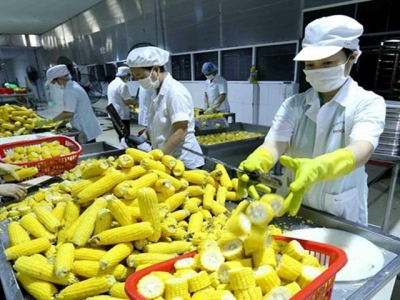RCEP helps Vietnamese agricultural products reach out to the world

The mammoth trade deal Regional Comprehensive Economic Partnership (RCEP) is expected to unlock more export markets for Vietnamese agricultural products, according to insiders.
Sweet corn processing for export (Photo: VNA)
At the “RCEP-UKVFTA opportunities to promote value chains of Vietnamese agricultural products” recently held in Ho Chi Minh City, Chairman of the Vietnam Farms and Agricultural Enterprises Association (VFAEA) Le Duy Minh laid stress on the world’s largest trade pact which covers a market of 2.2 billion people, with a combined GDP of 26.2 trillion USD or about 30 percent of global GDP.
RCEP is said to open up ample opportunities for Vietnamese agro-forestry-aquatic products since it forms a large market that includes Vietnam’s key importers such as China, ASEAN, Japan and the Republic of Korea (RoK), he added.
Nguyen Anh Dung, from the Ministry of Agriculture and Rural Development’s Agro Processing and Market Development Authority, said China is the second largest importer of Vietnamese agro-forestry-aquatic products with total imports worth 10.36 billion USD in 2020. Meanwhile, ASEAN came fourth with 3.69 billion USD, Japan fifth with 3.42 billion USD and the RoK seventh with 2.34 billion USD.
According to Secretary of the Vietnam Vegetables Association Tran Le Nguyen, only ten types of Vietnamese fruits are licensed to be exported to China via official channel, and with RCEP, negotiations for other fruits like durian, passion fruit, grape fruit, avocado, star apple, and rose apple will be much easier.
RCEP is also said to create favourable conditions for more Vietnamese products to enter Japanese, RoK, Australian, Thai, Malaysian and New Zealand markets, he added.
However, the Ministry of Industry and Trade said Vietnamese exporters may face fierce competition from their foreign rivals right on the domestic playground as other RCEP members like China and other ASEAN member states have similar fruits with better quality.
In this context, Vietnam needs to build a stable agriculture in which farmers must ensure food safety and improve product quality while businesses should help farmers to form a stable value chain, said Nguyen Dinh Tung, General Director of Vina T&T
Related news
 Thái Nguyên high-tech agricultural zone set up
Thái Nguyên high-tech agricultural zone set up Prime Minister Nguyễn Xuân Phúc has signed Decision No 70/QD-TTg on the establishment and issuance of operational regulations for the Thái Nguyên high-tech
 Organic dragon fruit cultivation expands in Long An
Organic dragon fruit cultivation expands in Long An The Cửu Long (Mekong) Delta province of Long An will expand cultivation of organic dragon fruit, primarily in Châu Thành District
 Coffee exports will flourish this year
Coffee exports will flourish this year After 2020, exports are not favourable due to the serious impact of the Covid-19 pandemic, Vietnam's coffee exports are expected to flourish in the first months